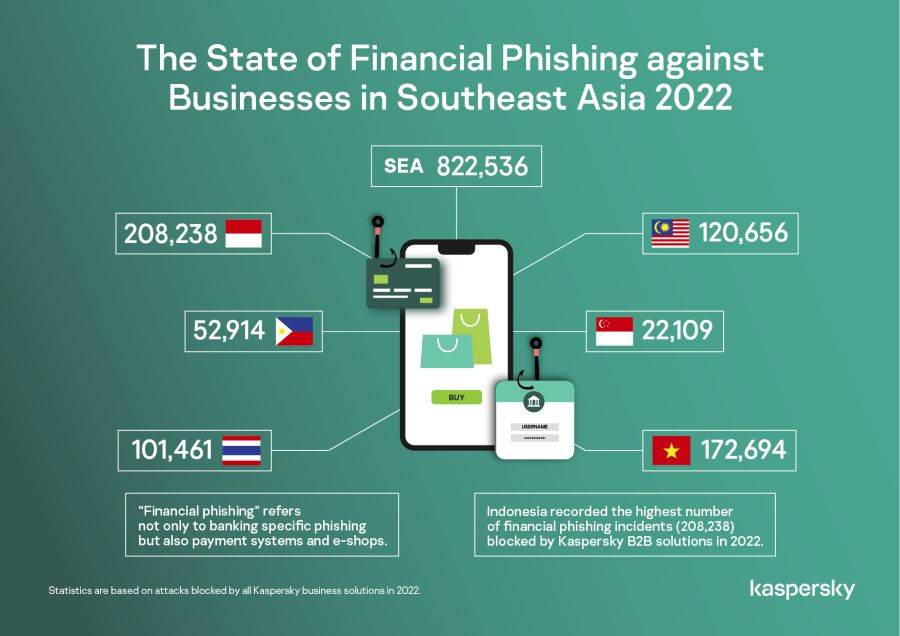Business
Phishing Attacks on the Rise: Kaspersky Blocks Over 800,000 Incidents in Southeast Asia


Phishing is an extremely common form of cybercrime because it is easy to execute and highly effective. Cybercriminals often send emails or notifications that mimic messages from legitimate organizations like banks or government agencies. These messages contain links to fraudulent websites that trick users into divulging personal or payment details or downloading malicious programs. In 2022, Kaspersky blocked over 822,000 financial phishing attempts aimed at companies in Southeast Asia. The highest number of incidents was recorded in Indonesia, followed by Vietnam and Malaysia.
In this case, “financial phishing” refers not only to banking-specific phishing but also to payment systems and e-shops. Payment system phishing includes pages impersonating well-known payment brands, such as PayPal, MasterCard, American Express, Visa, and others. E-shops refer to online stores and auction sites like Amazon, the Apple Store, Steam, eBay, etc.
Indonesia chalked up the highest number of financial phishing incidents (208,238). Vietnam comes second with 172,694, and Malaysia recorded 120,656. Thailand logged 101,461 phishing attempts related to finances, followed by the Philippines with 52,914, and Singapore with 22,109.
“It’s interesting to see companies being targeted by financial phishing but we have to remember here that businesses, at their core, are still made up of humans. Phishing is a type of social engineering attack. Social engineering attack is dubbed as hacking of the human mind. With nine out of ten employees needing basic cybersecurity skills training, cybercriminals know that the workforce remains a loophole they can exploit easily to launch a cyberattack against a company,” says Yeo Siang Tiong, General Manager for Southeast Asia at Kaspersky.
As reported, a phishing email is usually the first chapter of 91% of all cyberattacks. A phishing simulation done by Kaspersky reinforced how cybercriminals trick employees into clicking malicious mails.
It showed that workers tend not to notice pitfalls hidden in emails devoted to corporate issues and online delivery problem notifications and almost one in five (16% to 18%) clicked the link in the email templates imitating these phishing attacks.
Among the other phishing emails that gained a significant number of clicks are; reservation confirmations from a booking service (11%), a notification about an order placement (11%), and an IKEA contest announcement (10%).
To prevent complex attacks, and any related financial and reputational losses caused by phishing attacks, Kaspersky recommends the following for businesses:
- Remind your employees about the basic signs of phishing emails. A dramatic subject line, mistakes and typos, inconsistent sender addresses, and suspicious links;
- If there is any doubt about the received email, check the format of the attachments before opening them and the link accuracy before clicking. This can be achieved by hovering over these elements – making sure the address looks authentic and the attached files are not in an executable format;
- Always report phishing attacks. If you spot a phishing attack, report it to your IT security department and, if possible, avoid opening the malicious email. This will allow your cybersecurity team to reconfigure anti-spam policies and prevent an incident;
- Supply your employees with basic cybersecurity knowledge. Education should be aimed at changing the behavior of learners and teaching them how to deal with threats. As a major cybersecurity vendor, Kaspersky possesses a relevant base of information on real attacks and continuously supplements its Security Awareness Trainings in accordance with the current threat landscape;
- Since phishing attempts can be confusing, and there’s no guarantee of avoiding all accident clicks, protect your working devices and your enterprise perimeters with holistic expert security like Kaspersky Extended Detection and Response (XDR) platform. It provides anti-spam capabilities, tracks suspicious behavior, and creates a backup copy of your files in case of ransomware attacks. Anti-phishing protection is also included, as well as threat hunting.
Enterprises can find out more about this new platform at go.kaspersky.com/expert.
Kaspersky in Southeast Asia also has launched a Buy 1 Free 1 promo. Businesses can now enjoy two years of enterprise-grade endpoint protection for the price of 1 with Kaspersky Endpoint Security for Business or Cloud or Kaspersky Endpoint Detection and Response Optimum, with 24×7 phone support. Interested customers can reach out to sea.sales@kaspersky.com.













